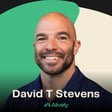
The Easiest Way to Make Healthy Habits Stick with Moriah Bacus - E69
Can you imagine trying to quit hard drugs, nicotine, and alcohol, while also building daily yoga, strength training, and plant-based eating - all in one go?
Most of us know the pain of setting health goals, slipping into overwhelm, and fizzling out before habits ever stick. The real challenge isn’t finding the next fitness plan or diet; it’s overcoming self-doubt, perfectionism, and that critical moment when old identity wins over new routines.
This episode breaks down how lasting change starts with mindset, self-compassion, and small, practical steps, guided by someone who completely transformed her life by taking on one hard thing at a time.
Moriah Bacus is fractional chief of staff, a project manager and accountability coach at Vibe High. With extensive professional experience and over 15 years specializing in project management across diverse sectors, Moriah takes complex visions and breaks them down into manageable, actionable steps. Her coaching approach combines exploratory and reflective questioning with practical project management strategies, helping visionary coaches and consultants get things done and ditch the overwhelm. She operates from the firm belief that true productivity stems from balance, recognizing that health and wellness, meaningful connections, and space for play all serve as essential foundations for a thriving business.
“Anchoring the habit in a specific time and place is probably one of the most powerful things you can do.” - Moriah Bacus
In this episode you will learn:
- Why building new health habits works best by starting with one small change at a time.
- The basics of human design and how understanding your energy type supports better habits.
- The ways mindset and self-talk play a role in lasting behavior change.
- How to shift your identity from “should” statements to “I am” statements for habit success.
- Simple ways to stack new habits onto existing routines for quick wins.
- How to break bad habits by making them harder to access and creating more positive cues.
Resources
- Connect with Moriah on Instagram: https://www.instagram.com/moriah.bacus/
- Learn more about Moriah’s offerings at Vibe High: https://vibehighhere.com/
This podcast was produced by the team at Zapods Podcast Agency:
Find the products, practices, and routines discussed on the Alively website:
















